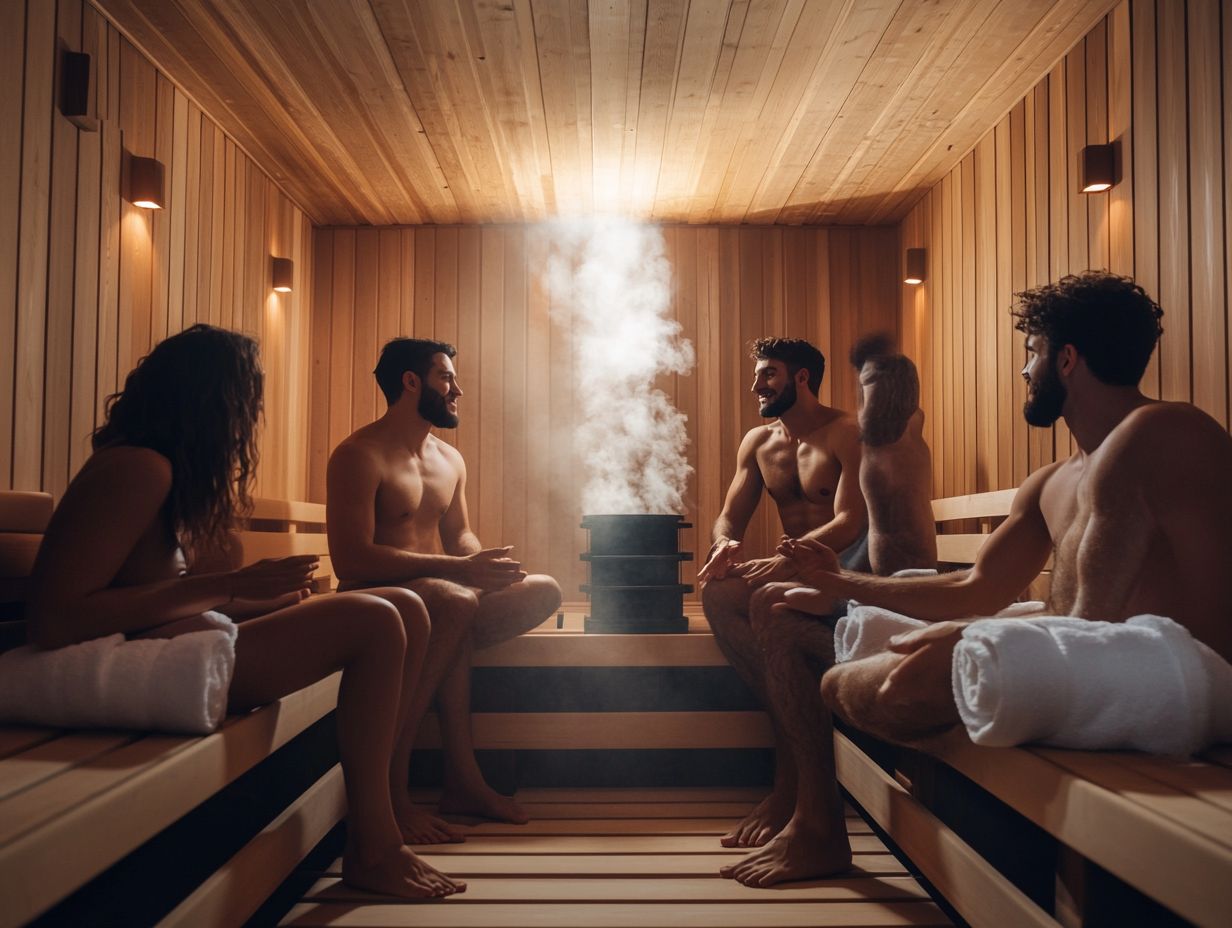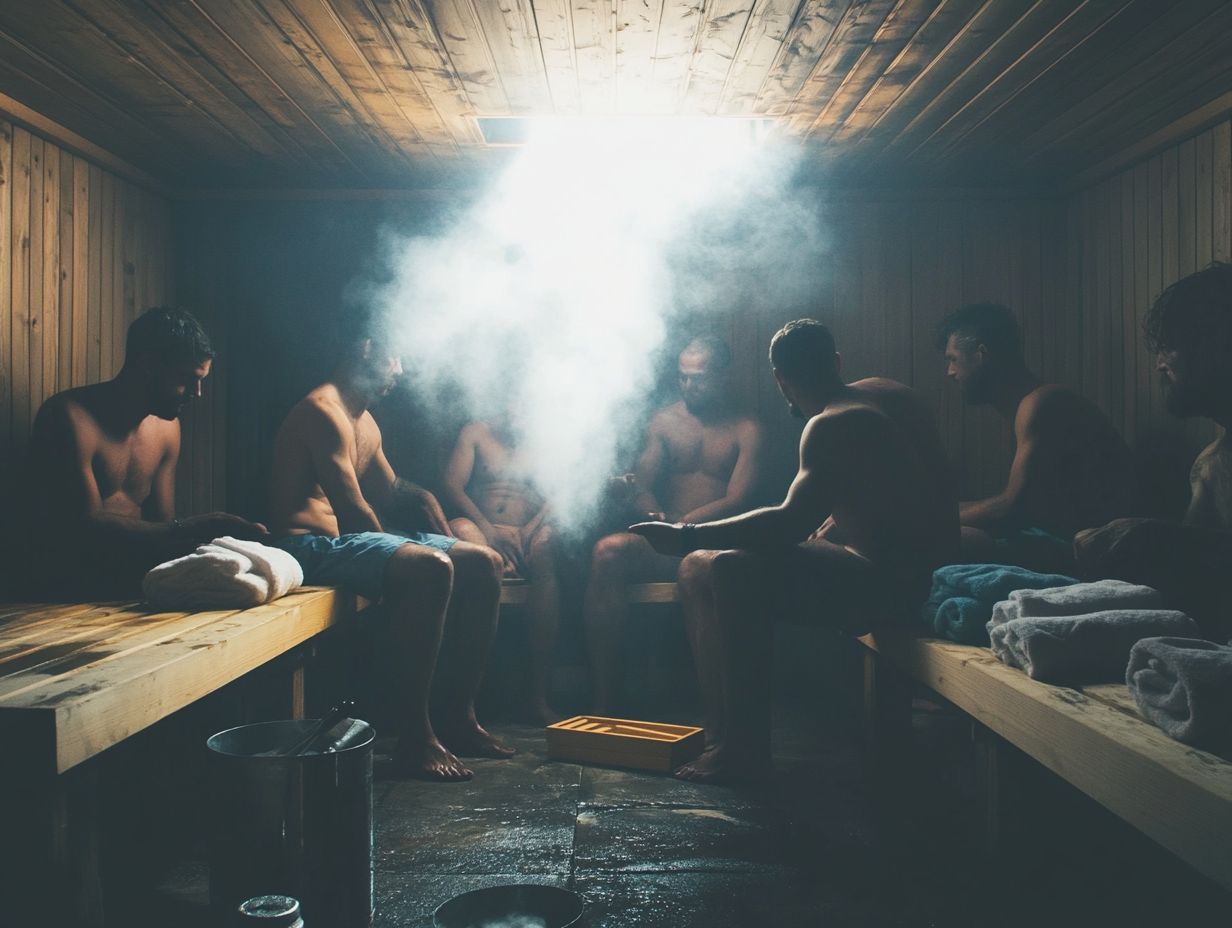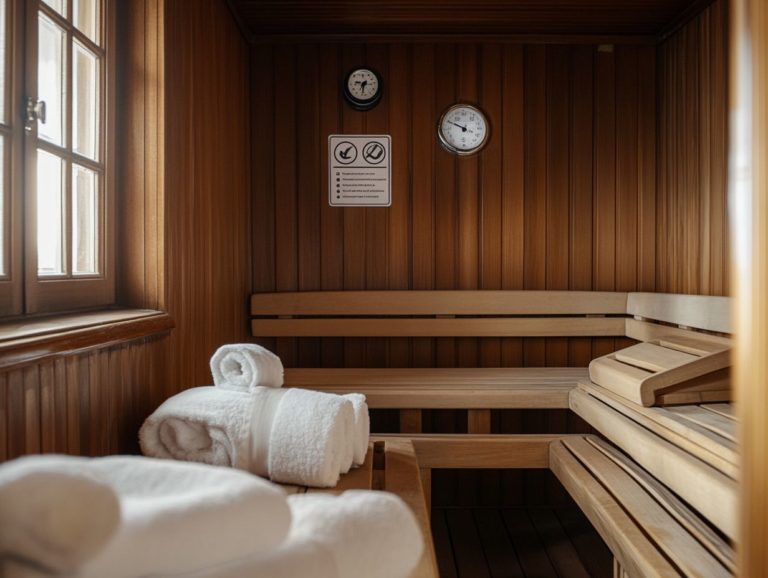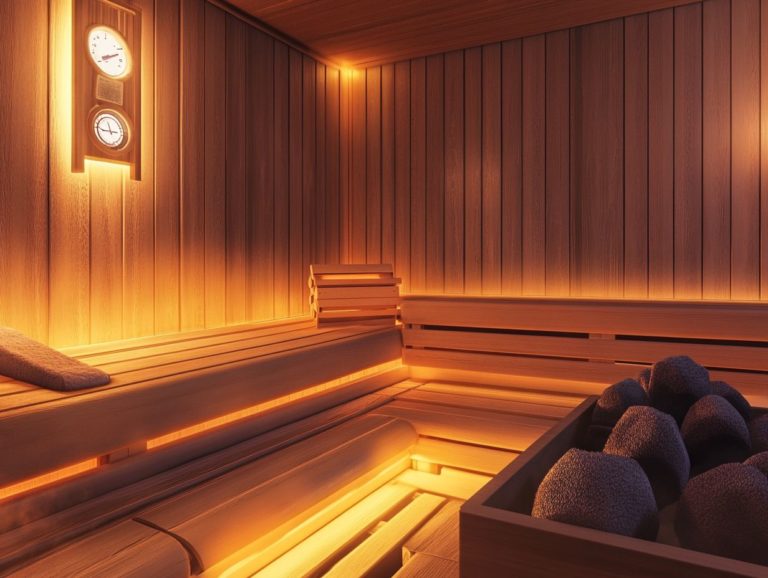Sauna Safety: Sharing Your Knowledge
Saunas have been treasured for their soothing and revitalizing qualities, yet understanding what’s good and what’s risky is crucial for a safe and enjoyable experience. Let’s explore the amazing world of saunas together!
This exploration will delve into what a sauna is and how it operates, highlighting the extraordinary physical and mental health advantages it presents. You’ll also discover the possible risks tied to sauna usage, complemented by essential safety guidelines to keep in mind.
Tips on how to educate others about sauna safety will be shared, inviting you to join this enlightening journey through the captivating world of saunas.
Contents
- Key Takeaways:
- Benefits of Using a Sauna
- Potential Risks of Sauna Use
- Safe Usage Guidelines
- Sharing Sauna Safety Knowledge
- Frequently Asked Questions
- What is sauna safety and why is it important?
- How can I make sure the sauna temperature is safe?
- Are there any health conditions that may prevent me from safely using a sauna?
- Is it safe to use a sauna alone?
- What should I do if I start feeling lightheaded or dizzy while using a sauna?
- How can I ensure the cleanliness and hygiene of the sauna?
Key Takeaways:

- Educate yourself on the benefits and risks of sauna use.
- Follow safety precautions when using a sauna.
- Share your sauna knowledge with others.
What is a Sauna and How Does it Work?
A sauna is more than just a small room or building; it s your personal sanctuary for indulging in dry or wet heat sessions, significantly enhancing your overall well-being. Originating from Finland, saunas employ various heating methods from traditional wood stoves to modern infrared technology to warm the air, elevate your body temperature, induce sweating, and promote a profound sense of relaxation.
As one of the oldest forms of heat therapy, saunas have evolved to include an array of types, such as steam rooms and infrared saunas, each offering unique experiences and health benefits.
These wellness spaces boast a rich history that stretches back thousands of years, serving not only as places for relaxation but also as vibrant social hubs in many cultures. Traditional saunas typically operate at temperatures between 150 F and 195 F, creating a dry heat that encourages perspiration, while steam rooms provide a moist environment that leads to a different sweating experience altogether. Infrared saunas, on the other hand, utilize infrared panels to directly warm your body, allowing for lower temperatures without compromising the effectiveness of sweating.
The science behind sweating in a sauna is compelling; it aids in detoxification and enhances circulation, offering a multitude of health benefits. Each type of sauna brings its own unique nuances to the experience, catering to your diverse preferences and wellness goals. Embrace the journey toward relaxation and rejuvenation as you explore the world of saunas.
Benefits of Using a Sauna
Using a sauna offers a wealth of health benefits, making it a favored choice among wellness enthusiasts and those in pursuit of relaxation. Engaging in regular sauna sessions can significantly enhance your heart health, boost circulation, reduce stress levels, and elevate your mental well-being all contributing to a more vibrant lifestyle.
Sweating during these sessions supports detoxification and enhances skin health, providing a holistic approach to wellness that many sauna aficionados cherish.
Physical and Mental Health Benefits
The benefits of sauna use for both physical and mental health are well-documented, making it an invaluable addition to your wellness routine.
Regular sauna sessions can enhance your heart health by promoting better circulation and potentially lowering your blood pressure over time. Research published in the Journal of the American College of Cardiology found that those who regularly enjoy saunas tend to have a reduced risk of heart-related issues.
Weight loss is another noteworthy advantage; the heat prompts your body to sweat and burn calories, giving your metabolism a nice little boost. On the mental health side, many people report significant stress relief and improved sleep patterns after their sauna sessions. For example, Finnish studies suggest that sauna use can lead to better sleep quality, which is crucial for overall well-being and mood stabilization.
Start enjoying saunas now and feel the difference! By incorporating this practice into your routine, you can cultivate both physical vitality and emotional resilience, enriching your overall quality of life.
Potential Risks of Sauna Use

While enjoying the myriad health benefits of sauna use, it s crucial to remain mindful of the potential risks that can accompany frequent sessions in high-heat environments. If you have pre-existing conditions like high blood pressure or heart issues, seeking medical advice before diving into sauna sessions is a wise move.
Be aware that dehydration and dizziness can arise if you don t take the necessary precautions, especially during prolonged stays in the sauna. Following appropriate safety guidelines is essential to ensure a safe and enjoyable experience.
Identifying and Addressing Risks
Identifying and addressing the risks associated with sauna use is essential for ensuring a safe and rewarding experience. Key risks, such as dehydration and dizziness, can be amplified by factors like alcohol consumption and prolonged exposure to heat.
Therefore, take necessary precautions, such as staying hydrated and monitoring your time in the sauna, to prevent any unpleasant effects.
Along with hydration strategies, it s important to be mindful of your individual health conditions. If you have cardiovascular issues or respiratory problems, consult a healthcare provider before using the sauna.
Try to limit your sauna sessions to 15 to 20 minutes. This can significantly reduce risks, allowing your body to adapt to temperature changes without undue strain. Incorporating breaks and rehydrating with minerals that help keep you hydrated can further elevate your experience, making it both enjoyable and safe.
By being aware of these precautions, you can confidently enjoy the numerous health benefits of sauna use while minimizing potential hazards.
Safe Usage Guidelines
To truly maximize the benefits and minimize the risks associated with sauna use, follow these key practices: hydrate thoroughly before and during your sauna sessions, limit your time in the heat, and observe proper sauna etiquette.
Being mindful of your individual health conditions and seeking medical advice when necessary can elevate your sauna experience while ensuring your safety.
Proper Precautions and Procedures
Implementing the right precautions and procedures during sauna use is essential for both your safety and enjoyment. Ensure inexperienced users have adequate supervision and maintain your sauna s electrical system and heater.
Follow safety tips, like avoiding excessive alcohol consumption before your sessions. By embracing these practices, you can cultivate a safe and pleasurable sauna environment.
Monitoring heat levels is key. If you re a beginner, start at a lower temperature to allow your body to acclimate gradually. Maintaining hygiene through regular cleaning and periodic checks of accessories, like towels, not only boosts your comfort but also enhances safety.
If you re unfamiliar with sauna routines, it s wise to have experienced users accompany you for guidance. They can help reinforce the importance of respecting your personal limits and understanding the signals your body sends.
Additionally, ensuring proper ventilation within the sauna prevents excessive humidity, contributing to a more comfortable and health-conscious experience.
Sharing Sauna Safety Knowledge

Let s create a community where everyone shares sauna safety knowledge to foster a secure environment for both seasoned enthusiasts and newcomers. Educating others on essential sauna guidelines like hydration, time limits, and etiquette elevates everyone s experience and helps them fully embrace the health benefits that this ancient practice offers.
Cultivating a community of informed sauna lovers not only enhances enjoyment but also promotes safety, ensuring that all can enjoy this enriching experience to the fullest.
Share your sauna experiences or tips for safety with others!
Tips for Educating Others
Let s talk about how to enjoy your sauna experience! Educating others on sauna etiquette and safety tips can elevate their sauna experience, making it both enjoyable and secure. By sharing straightforward rules, such as:
- Respecting time limits
- Practicing proper hygiene
- Maintaining a serene atmosphere
You contribute to an environment that promotes relaxation and well-being for all sauna enthusiasts. This knowledge sharing enhances safety and enriches the enjoyment of sauna use.
It’s crucial to highlight the importance of staying hydrated before and after sessions to prevent dehydration and ensure a more satisfying experience. Engaging new sauna users in conversations about how hot it should be and personal comfort helps them understand their limits and adapt with ease.
Emphasizing the health benefits, such as improved circulation and stress relief, can inspire others to embrace this wellness practice.
By fostering open dialogue about safety measures and the etiquette of shared spaces, you help create a collective experience where everyone can relish the rejuvenating effects of sauna sessions while contributing to a harmonious environment.
Frequently Asked Questions
Here are some common questions about sauna safety:
What is sauna safety and why is it important?
Sauna safety refers to taking precautions and following guidelines to ensure the safe use of a sauna. It is important because saunas can pose potential risks if not used properly, such as burns, dehydration, and fainting.
How can I make sure the sauna temperature is safe?

To ensure the sauna temperature is safe, always check the recommended temperature guidelines before using the sauna. Listen to your body and exit the sauna if you start feeling uncomfortable or dizzy.
Are there any health conditions that may prevent me from safely using a sauna?
Yes, individuals with certain health conditions such as heart disease, high blood pressure, or pregnancy should consult with their doctor before using a sauna. Saunas can also be risky for those with diabetes or other chronic conditions.
Is it safe to use a sauna alone?
It is not recommended to use a sauna alone due to the risk of fainting or other accidents. It’s best to have someone nearby who can assist you if needed.
What should I do if I start feeling lightheaded or dizzy while using a sauna?
Act fast if you feel dizzy your safety comes first! If you start feeling lightheaded or dizzy, exit the sauna immediately and cool down. Drink plenty of water to rehydrate and avoid going back into the sauna until you feel better.
How can I ensure the cleanliness and hygiene of the sauna?
To maintain cleanliness and hygiene in the sauna:
- Always use a towel to sit on.
- Avoid touching surfaces with your bare skin.
- Shower beforehand.
- Avoid using lotions or oils in the sauna.
Ready to dive into a rejuvenating sauna experience? Follow these tips!






